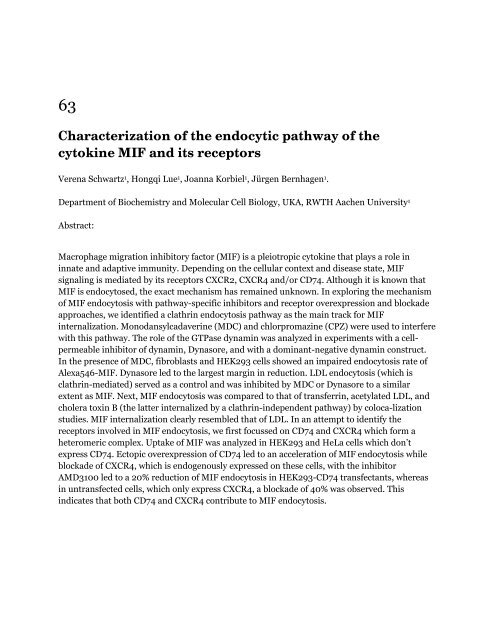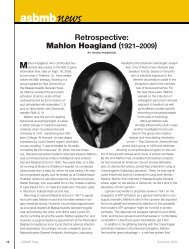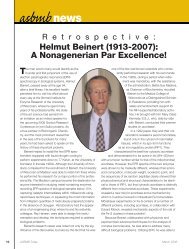View Program - asbmb
View Program - asbmb
View Program - asbmb
- TAGS
- program
- asbmb
- www.asbmb.org
Create successful ePaper yourself
Turn your PDF publications into a flip-book with our unique Google optimized e-Paper software.
63<br />
Characterization of the endocytic pathway of the<br />
cytokine MIF and its receptors<br />
Verena Schwartz 1 , Hongqi Lue 1 , Joanna Korbiel 1 , Jürgen Bernhagen 1 .<br />
Department of Biochemistry and Molecular Cell Biology, UKA, RWTH Aachen University 1<br />
Abstract:<br />
Macrophage migration inhibitory factor (MIF) is a pleiotropic cytokine that plays a role in<br />
innate and adaptive immunity. Depending on the cellular context and disease state, MIF<br />
signaling is mediated by its receptors CXCR2, CXCR4 and/or CD74. Although it is known that<br />
MIF is endocytosed, the exact mechanism has remained unknown. In exploring the mechanism<br />
of MIF endocytosis with pathway-specific inhibitors and receptor overexpression and blockade<br />
approaches, we identified a clathrin endocytosis pathway as the main track for MIF<br />
internalization. Monodansylcadaverine (MDC) and chlorpromazine (CPZ) were used to interfere<br />
with this pathway. The role of the GTPase dynamin was analyzed in experiments with a cellpermeable<br />
inhibitor of dynamin, Dynasore, and with a dominant-negative dynamin construct.<br />
In the presence of MDC, fibroblasts and HEK293 cells showed an impaired endocytosis rate of<br />
Alexa546-MIF. Dynasore led to the largest margin in reduction. LDL endocytosis (which is<br />
clathrin-mediated) served as a control and was inhibited by MDC or Dynasore to a similar<br />
extent as MIF. Next, MIF endocytosis was compared to that of transferrin, acetylated LDL, and<br />
cholera toxin B (the latter internalized by a clathrin-independent pathway) by coloca-lization<br />
studies. MIF internalization clearly resembled that of LDL. In an attempt to identify the<br />
receptors involved in MIF endocytosis, we first focussed on CD74 and CXCR4 which form a<br />
heteromeric complex. Uptake of MIF was analyzed in HEK293 and HeLa cells which don’t<br />
express CD74. Ectopic overexpression of CD74 led to an acceleration of MIF endocytosis while<br />
blockade of CXCR4, which is endogenously expressed on these cells, with the inhibitor<br />
AMD3100 led to a 20% reduction of MIF endocytosis in HEK293-CD74 transfectants, whereas<br />
in untransfected cells, which only express CXCR4, a blockade of 40% was observed. This<br />
indicates that both CD74 and CXCR4 contribute to MIF endocytosis.






